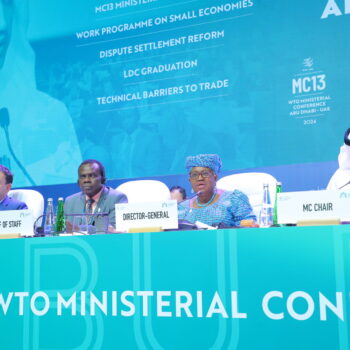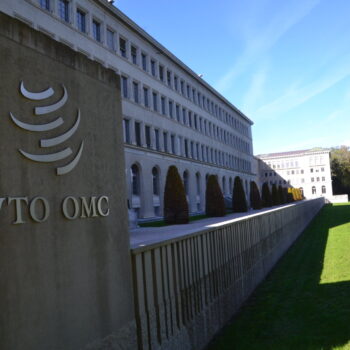Ofgem’s proposals for regulating energy network businesses have provided a clear example that UK regulatory framework needs major revision if we are to deliver net-zero emissions.
The regulation of our electricity and gas network companies is a very complex topic – understood by few but with huge ramifications for us all. A green recovery and net-zero emissions require huge changes to our energy system, and regulators have a key role to play in ensuring it is done at speed and in a way that is affordable to everyone.
Ofgem is in the process of finalising the regulatory arrangement for the electricity transmission system operator and the gas network operators, that will run from 2021 to 2026. It will shortly turn attention to the operators of the local electricity distribution companies and set regulations for the period from 2023 to 2028.
The reason these regulations are so important is that the networks represent the backbone of our national energy infrastructure – both constraining and enabling how the system develops. They are also very expensive businesses to run. Ofgem is suggesting that investment in the electricity system and gas networks alone will cost between £25bn and £35bn over the five-year period covered by the regulatory review. The challenge that Ofgem faces is, therefore, to find a way to incentivise the network companies to make the investments necessary to achieve net-zero whilst minimising costs to consumers.
Ofgem has now launched their proposals for addressing this conundrum with Chief Executive Jonathan Brearley stating ‘We are striking a fair deal for consumers. Less of your money will go towards company shareholders and more into improving the network to power the economy and to fight climate change’. Network companies have not been so enthusiastic. Scottish Power Energy Networks CEO Frank Mitchell expressed views that are common in the industry when he said ‘This was Jonathan Brearley’s first big test as the new Ofgem Chief Executive and he’s flunked it. Instead of backing Britain he has put Britain in the slow lane of leading economies’.
These differences of view should not be a surprise – regulatory reviews are ultimately a commercial negotiation with huge amounts of money at stake. To understand where the truth lies it is important to differentiate between two elements of the review: identifying the investments required to maintain and develop the network, and setting the level of profits that the companies are allowed to make for successfully delivering these investments.
Ofgem has come down hard on the financial returns that the companies can make. Network companies have been making generous profits for many years and the clampdown is long overdue. Whilst there has been an inevitable pushback on this issue from the companies, they have also complained that Ofgem is preventing them making the investments needed to deliver a net-zero energy system. Put simply, Ofgem has told the companies they must prove more investment is needed if they are to get the money. It is this issue that is particularly concerning for those interested in a successful energy system transition.
It has always been the job of the companies to plan the development of their network to meet future demands for their services, and the job of Ofgem to challenge and ultimately approve these proposals. This has worked well in driving out costs whilst the energy system has slowly evolved over the last 30 years. However, delivering net-zero requires more radical changes and the current regulatory approach is struggling to cope with this new challenge.
Firstly, it is wrong that the network companies derive the assumptions that determine the future need for their networks. The entire energy system is becoming more interconnected as we drive more electric cars and heat our homes with electric heat pumps rather than gas boilers. The entire industry must be working from the same hymn sheet about the future as it develops detailed plans. Also, there are inevitable conflicts of interest. This is particularly stark for the gas network operators since net-zero means the end of using fossil fuels and is, therefore, an existential threat to their businesses. They have tried to address this problem with ambitious claims about the potential to re-purpose the gas network to use hydrogen. How much cheap hydrogen can be produced from surplus renewable electricity – the only form of hydrogen compatible with net-zero – is a vital assumption for the future of the national energy system and deserves rigorous independent evaluation.
The second problem is that the Ofgem process cannot cope with the level of future uncertainty. Apart from the hydrogen issue, the extent to which consumers will install solar panels and insulation, buy electric vehicles, or adopt digital systems to control energy usage are all unknown but critical in determining future network requirements. Ofgem is not willing to let the network companies spend additional money on preparing for a future that may not arise when this additional money is obtained by increasing the bills of current consumers. However, unless networks are upgraded in advance, developments necessary to deliver net-zero will not be able to proceed at the rate required. A way must be found to break this logjam.
The regulatory system that was designed at different time and for a different set of challenges is no longer working in the interests of consumers – current or future. Ofgem must admit to the deficiencies and the Government must be prepared to make changes. The central requirement is to ensure the entire energy system is working on the same set of assumptions about the future such that important choices about investment priorities can be made. This should be based on current best views of technology costs and deployment potentials and be independently and transparently derived. It will enable infrastructure plans for the whole energy system to be developed in a coherent and timely fashion – again, ideally, independent of the vested commercial interests.
Ofgem should no longer have to worry about second-guessing the investment plans of network companies. Instead, it should ensure the regulations and markets it governs deliver what is required as cheaply as possible. Concerns about who pays for the transition – energy consumers or taxpayers, low- or higher-income households – are questions for Government and not the regulator and should be addressed as a matter of priority.
The regulatory reviews of network companies are part of a system that is no longer fit for purpose. As the government looks for an economic recovery from COVID-19 that ‘builds back better’, we need an energy system that works for both current and future consumers. This cannot happen without grasping the nettle and making some critical changes. It should establish an independent body responsible for defining assumptions about the future and recommending critical outcomes that must be delivered. Infrastructure plans must be created for the whole energy system and based on these recommendations – perhaps building on the role of the electricity system operator that is now largely independent of the National Grid network business. And Ofgem must be responsible for the timely and cost-effective delivery of what is required.
We cannot expect a system designed to support incremental change to deliver a radical transformation. Now is the time to bite the bullet and create a regulatory system capable of delivering net-zero.


